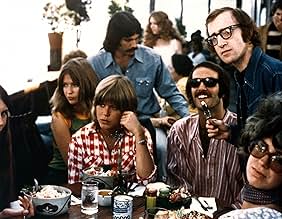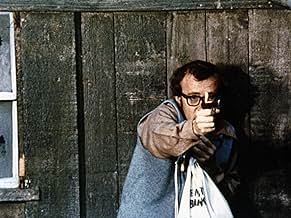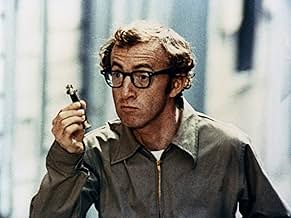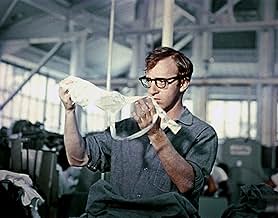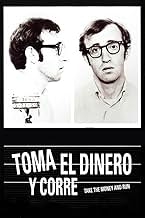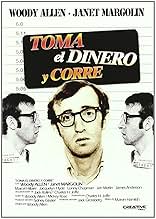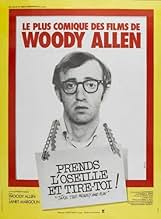VALUTAZIONE IMDb
7,2/10
32.372
LA TUA VALUTAZIONE
La vita e i tempi di Virgil Starkwell, inetto rapinatore di banche.La vita e i tempi di Virgil Starkwell, inetto rapinatore di banche.La vita e i tempi di Virgil Starkwell, inetto rapinatore di banche.
- Premi
- 3 candidature totali
Dan Frazer
- Julius Epstein - The Psychiatrist
- (as Don Frazier)
Jackson Beck
- The Narrator
- (voce)
Recensioni in evidenza
Very early Woody Allen winner has the all-time lovable loser trying to make ends meet with girlfriend and future wife Janet Margolin. Allen, obviously pretty unskilled in most everything, decides that he can do just what the title of the film says and achieve true happiness with his one true love. Documentary-styled footage makes the picture unfold in a quietly uproarious way as Allen uses corny techniques used by most news organizations to tell a story that would have looked very odd without his insight being involved. Allen's films only work because he makes them work usually and that is definitely the case with "Take the Money and Run". Once again he shows unlimited potential and would use this movie, more than any other, as a spring-board for much future success in the 1970s, 1980s and beyond. 4 stars out of 5.
Woody Allen hit gold with his second film, "Take the Money and Run", which is a basic film that works on so many levels and is memorable strictly for its charm and good wit.
The story follows Allen's Virgil Starkwell, whose life is told in documentary fashion. We learn he had a strange childhood and turned to crime to fulfill his needs. We learn of his romance and sympathize with him as we engage in prison escapes and witness him put in a chain gang. The documentary style might prove to be a "gimmick" of sorts, but it works because had the story been told any other way it simply would not have worked.
Also, "Take the Money" is an early token of what's to come and what the general audience will expect of Allen; smooth drama balanced by fast, witty monologues and lots of self-humiliation. To see this is to witness the early work of the director who ultimately brought us "Bananas", "Sleeper", "Manhattan", and the Oscar-winning "Annie Hall". And if anything, just track it for its over-the-top humor, not as in-your-face funny as "Sleeper" or as sexually hilarious as "Annie Hall", but it's warm and withdrawn, balanced all together by a very good ending (always one of the weaker parts in almost all of Allen's films).
Highly recommended! ***+ (8.5/10)
The story follows Allen's Virgil Starkwell, whose life is told in documentary fashion. We learn he had a strange childhood and turned to crime to fulfill his needs. We learn of his romance and sympathize with him as we engage in prison escapes and witness him put in a chain gang. The documentary style might prove to be a "gimmick" of sorts, but it works because had the story been told any other way it simply would not have worked.
Also, "Take the Money" is an early token of what's to come and what the general audience will expect of Allen; smooth drama balanced by fast, witty monologues and lots of self-humiliation. To see this is to witness the early work of the director who ultimately brought us "Bananas", "Sleeper", "Manhattan", and the Oscar-winning "Annie Hall". And if anything, just track it for its over-the-top humor, not as in-your-face funny as "Sleeper" or as sexually hilarious as "Annie Hall", but it's warm and withdrawn, balanced all together by a very good ending (always one of the weaker parts in almost all of Allen's films).
Highly recommended! ***+ (8.5/10)
The clumsy Virgil Starkwell (Woody Allen) is bullied when he is a child. Then he decides to play cello, but without musical talent, the loser joins a street gang and ends in prison. When he escapes, he meets the laundry worker Louise (Janet Margolin) and lies to her, telling that he plays cello in the symphonic orchestra.
He is arrested in a hold up and Louise finds him in prison. He breaks out and flees with Louise to another state. He tries to be honest but he is incapable to fit in any job. When he finally finds a job position suitable for his intellect, he is blackmailed by a colleague and returns to his criminal life. But his heists are disastrous and he always ends in prison.
"Take the Money and Run" is the second film by Woody Allen in a documentary style the same way he does with "Zelig" in 1983, and tells the saga of a clumsy smalltime thief. The last time I had seen this film was on 22 August 1999 and this time I found it still enjoyable, but less than the last time.
Virgil Starkwell is an incompetent loser obsessed with bank heists. The narrative and interviews in the documentary style of the 60's and 70's have hilarious moments and is closed by the funny interview of his neighbor that asks to the interviewer how an imbecile like Virgil could plan the heist of banks. My vote is seven.
Title (Brazil): "Um Assaltante Bem Trapalhão" ("A Very Clumsy Thief")
He is arrested in a hold up and Louise finds him in prison. He breaks out and flees with Louise to another state. He tries to be honest but he is incapable to fit in any job. When he finally finds a job position suitable for his intellect, he is blackmailed by a colleague and returns to his criminal life. But his heists are disastrous and he always ends in prison.
"Take the Money and Run" is the second film by Woody Allen in a documentary style the same way he does with "Zelig" in 1983, and tells the saga of a clumsy smalltime thief. The last time I had seen this film was on 22 August 1999 and this time I found it still enjoyable, but less than the last time.
Virgil Starkwell is an incompetent loser obsessed with bank heists. The narrative and interviews in the documentary style of the 60's and 70's have hilarious moments and is closed by the funny interview of his neighbor that asks to the interviewer how an imbecile like Virgil could plan the heist of banks. My vote is seven.
Title (Brazil): "Um Assaltante Bem Trapalhão" ("A Very Clumsy Thief")
Take the Money and Run (1969) was Woody Allen's motion picture debut (sans 'Tiger Lily). The film follows the life of a criminal loser, shot in a faux documentary style. Allen used the most out of his small budget and made an amusing film. This was the beginning of his slapstick/farce phase that would last until the early 70's. An interesting start for one of America's most unique film-makers of that era. The script by Mickey Rose and Woody Allen is deeply engraved with screwball humor from their childhood icons such as the Marx Brothers and Charles Chaplin. This film showed the promise of a brilliant director who would become a major player in Hollywood in the years to come. Highly recommended.
A.
A.
Now I'm rarely a man to agree with any 'consensus view' of particular films, yet I very much have to go along with the tide as regards 'Take the Money and Run' - only the second Allen film I have commented upon here, though I have seen many more.
Basically, the film is enjoyable viewing throughout, but not an entirely consistent, successful comedy. Allen had yet to hone his skills in fashioning feature length films; I have reservations more so for 'Bananas', less so for 'Sleeper' and 'Love and Death'; the two films with which he really hits his stride. This is his first film as a director and thus maybe it is to be expected that we'll see a transitional film. One can tell Allen is trying to work out a formula to translate his largely verbal stand-up humour to film. He really does a pretty good job of this. There are plenty of very good jokes and a generally very lightweight, genial tone to this picture. It is seen through by this, yet is hamstrung by its very effervescence; the film is likeable and won me over, yet it is too scattershot in approach and delivery to really satisfy.
Woody himself is an instantly winning figure in his comic persona; that of a physically diminutive and verbally bumbling Jewish intellectual. With in this film the vocation of a bank robber; a displacement which results in much of the expected amusement. There's not yet any attempt to go very deep into this character of his, but this is a pure, light comedy. No real New York or indeed Bergman or Chekhov reference points yet.
One is reminded in Allen of David Thomson's insightful comments on Chaplin and the persona he projected to audiences; trying to charm them and win them over by a certain vulnerability and status as 'underdog'. It is very true that in many of Allen's films, like Chaplin, he is right at the centre of the film, and the world outside is not portrayed with any sense of the mechanics of reality. Conflicts are never all that serious or convincing; he draws from a limited pool of character types, in socio-political terms. Allen has done films with other leads; though his usual concerns always find their way through. 'Take the Money and Run' is full of the Chaplin tendency to have bullish, physically imposing figures, or indeed perhaps a wider society, threatening the 'little man'. There is a wish-fulfilment woman in the languid person of Janet Margolin's Louise; as a character more a projection than of flesh and blood or shades of grey. She works well as a slightly wan, attractive comic foil for Allen, who doesn't mind getting her hands dirty, but she's really not Diane Keaton.
This film is slight, no question about that... it fails under real scrutiny, yet it is largely very enticing stuff; an early glimpse of Allen getting his filmic technique in order. If you like what the man does - and surely most (wryly bespectacled) film cineastes such as I do! - then you are sure to enjoy this film. Just don't count on it being a triumph in the major key.
Rating:- *** 1/2/*****
Basically, the film is enjoyable viewing throughout, but not an entirely consistent, successful comedy. Allen had yet to hone his skills in fashioning feature length films; I have reservations more so for 'Bananas', less so for 'Sleeper' and 'Love and Death'; the two films with which he really hits his stride. This is his first film as a director and thus maybe it is to be expected that we'll see a transitional film. One can tell Allen is trying to work out a formula to translate his largely verbal stand-up humour to film. He really does a pretty good job of this. There are plenty of very good jokes and a generally very lightweight, genial tone to this picture. It is seen through by this, yet is hamstrung by its very effervescence; the film is likeable and won me over, yet it is too scattershot in approach and delivery to really satisfy.
Woody himself is an instantly winning figure in his comic persona; that of a physically diminutive and verbally bumbling Jewish intellectual. With in this film the vocation of a bank robber; a displacement which results in much of the expected amusement. There's not yet any attempt to go very deep into this character of his, but this is a pure, light comedy. No real New York or indeed Bergman or Chekhov reference points yet.
One is reminded in Allen of David Thomson's insightful comments on Chaplin and the persona he projected to audiences; trying to charm them and win them over by a certain vulnerability and status as 'underdog'. It is very true that in many of Allen's films, like Chaplin, he is right at the centre of the film, and the world outside is not portrayed with any sense of the mechanics of reality. Conflicts are never all that serious or convincing; he draws from a limited pool of character types, in socio-political terms. Allen has done films with other leads; though his usual concerns always find their way through. 'Take the Money and Run' is full of the Chaplin tendency to have bullish, physically imposing figures, or indeed perhaps a wider society, threatening the 'little man'. There is a wish-fulfilment woman in the languid person of Janet Margolin's Louise; as a character more a projection than of flesh and blood or shades of grey. She works well as a slightly wan, attractive comic foil for Allen, who doesn't mind getting her hands dirty, but she's really not Diane Keaton.
This film is slight, no question about that... it fails under real scrutiny, yet it is largely very enticing stuff; an early glimpse of Allen getting his filmic technique in order. If you like what the man does - and surely most (wryly bespectacled) film cineastes such as I do! - then you are sure to enjoy this film. Just don't count on it being a triumph in the major key.
Rating:- *** 1/2/*****
Lo sapevi?
- QuizThe first widely-released "mockumentary".
- BlooperAs the chain gang escapes, they climb the same embankment twice.
- ConnessioniFeatured in The Dick Cavett Show: Woody Allen (1971)
I più visti
Accedi per valutare e creare un elenco di titoli salvati per ottenere consigli personalizzati
- How long is Take the Money and Run?Powered by Alexa
Dettagli
- Data di uscita
- Paese di origine
- Lingue
- Celebre anche come
- Take the Money and Run
- Luoghi delle riprese
- Aziende produttrici
- Vedi altri crediti dell’azienda su IMDbPro
Botteghino
- Budget
- 1.500.000 USD (previsto)
- Tempo di esecuzione
- 1h 25min(85 min)
- Mix di suoni
- Proporzioni
- 1.85 : 1
Contribuisci a questa pagina
Suggerisci una modifica o aggiungi i contenuti mancanti



